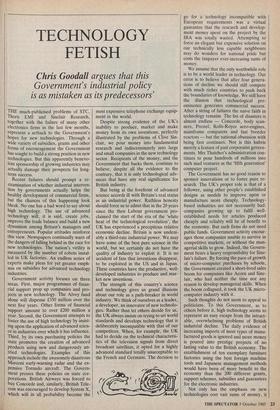TECHNOLOGY FETISH
Chris Goodall argues that this
Government's industrial policy is as mistaken as its predecessors'
THE much-publicised problems of STC, Thorn EMI and Sinclair Research, together with the failure of many other electronics firms in the last few months, represent a setback to the Government's hopes for new technologies. Through a wide variety of subsidies, grants and other forms of encouragement the Government has sought to build a strong position in new technologies. But this apparently benevo- lent sponsorship of growing industries may actually damage their prospects for long- term success.
Recent failures should prompt a re- examination of whether industrial interven- tion by governments actually helps the healthy development of commercial firms, but the chances of this happening look bleak. No one has a bad word to say about high technology. The use of advanced technology will, it is said, create jobs, improve the trade balance and build a new dynamism among Britain's managers and entrepreneurs. Popular attitudes reinforce this view. Newspapers continually warn of the dangers of falling behind in the race for new technologies. The nation's virility is measured by the number of robots instal- led in UK factories. An endless series of experts make pleas for yet greater emph- asis on subsidies for advanced technology industries.
Government activity focuses on three areas. First, major programmes of finan- cial support prop up companies and pro- jects in new technology. The Alvey fund alone will dispense £350 million over the next five years. Other forms of financial support amount to over £200 million a year. Second, the Government attempts to foster the use of high technology by insist- ing upon the application of advanced scien- ce in industries over which it has influence. Third, by its own purchasing policies the state promotes the creation of advanced products using new and dangerously un- tried technologies. Examples of this approach include the awesomely disastrous Marconi early-warning radar and the ex- pensive Tornado aircraft. The Govern- ment presses these policies on state cor- porations. British Airways was forced to buy Concorde and, similarly, British Tele- com was encouraged to develop System X, which will in all probability become the most expensive telephone exchange equip- ment in the world.
Despite strong evidence of the. UK's inability to produce, market and make money from its own inventions, perfectly illustrated by the problems of Clive Sin- clair, we pour money into fundamental research and indiscriminately into large and small companies in the new technology sector. Recipients of the money, and the Government that backs them, continue to believe, despite all the evidence to the contrary, that it is only technological adv- ances that have any real significance for British industry.
But being at the forefront of advanced science accords ill with Britain's real status as an industrial power. Ruthless honesty should force us to admit that in the 20 years since the then Labour government pro- claimed the start of the era of the 'white heat of the technological revolution', the UK has experienced a precipitous relative economic decline. Britain is now undeni- ably a third-rate industrial power. We may have some of the best pure science in the world, but we certainly do not have the quality of industry to exploit it. It is no accident of fate that inventions disappear, to be exploited in the US and in Japan. These countries have the productive, well- developed industries to produce and mar- ket new inventions.
The strength of this country's science and technology gives us grand illusions about our role as a path-breaker in world industry. We think of ourselves as a leader, a developer, an innovator of new technolo- gies. Rather than let others decide for us, the UK always insists on trying to set world standards and develops technology that is deliberately incompatible with that of our competitors. When, for example, the UK had to decide on the technical characteris- tics of the television signals from direct broadcast satellites, it opted for a highly advanced standard totally unacceptable to the French and Germans. The decision to go for a technology incompatible with European requirements was a virtual guarantee that the research and develop- ment money spent on the project by the IBA was totally wasted. Attempting to force an elegant but expensive solution on our technically less capable neighbours may do wonders for national pride but costs the taxpayer ever-increasing sums of money.
We assume that the only worthwhile role is to be a world leader in technology. Our error is to believe that after four genera- tions of decline we should still compete with much richer countries to push back the boundaries of knowledge. We still have the illusion that technological pre- eminence generates commercial success. After a string of failures the naive faith in technology remains. The list of disasters is almost endless — Concorde, body scan- ners, Prestel, Rolls-Royce aero-engines, mainframe computers and fast breeder reactors — but the national obsession with being first continues. Nor is this hubris merely a feature of past corporatist govern- ments. Mrs Thatcher's administration con- tinues to pour hundreds of millions into such mad ventures as the 'fifth generation' computer project.
The Government has no good reason to sponsor innovations or to foster pure re- search. The UK's proper role is that of a follower, using other people's established designs as models to improve upon or manufacture more cheaply. Technology- based industries are not necessarily bad: companies growing up to fulfil well- established needs for articles produced cheaply and reliably will be of benefit to the economy. But such firms do not need public funds. Government activity encour- ages those companies unable to survive in competitive markets, or without the man- agerial skills to grow. Indeed, the Govern- ment bears a heavy responsibility for Sinc- lair's failure. By forcing the pace of growth of micro-computer purchases by schools, the Government created a short-lived sales boom for companies like Acorn and Sinc- lair, who had neither the time nor any reason to develop managerial skills. When the boom collapsed, it took the UK micro- computer industry with it.
Such thoughts do not seem to appeal to politicians. To this Government, as to others before it, high technology seems to represent an easy escape from the intract- able, overwhelming problems of British industrial decline. The daily evidence of increasing imports of most types of manu- factured goods is ignored and more money is poured into prestige projects of no lasting value to the British economy. The establishment of ten exemplary furniture factories using the best foreign machine tools and Japanese management methods would have been of more benefit to the economy than the 200 different grants, support schemes, subsidies and guarantees for the electronic industries.
Not only has the emphasis on new technologies cost vast sums of money, it has also made more difficult the task of retaining the best scientists and engineers in the UK. The active support for technol- ogy, combined with a flaccid commercial environment, means that many competent engineers and scientists are trained to the pont where they are far more useful to firms abroad than to a UK enterprise. Much of the credit for the success of Silicon Valley lies in the universities and research institutes of the UK.
The prestige attached to high technology has other malign consequences. By over- stating the importance of the technological aspects of business, all other features are downgraded. If scientists and engineers believe, as they are continually told, that technological pre-eminence is valuable in itself, then they will belittle any focus on incremental improvements, or changes necessary to make their work more marketable. Indeed, the technological fet- ish is part of this country's anti-business culture. It reinforces the national presump- tion that producing basic manufactured goods cheaply and reliably remains an activity of marginal value.
The UK has to face the reality that the fascination with technology is a form of national escapism. Building a temporarily successful home computer industry, at vast financial cost, has had no effect whatsoever on the overall prosperity of the country. It has wasted the talents of thousands of engineers, and has created a public know- ledgeable about computers who will now have little alternative but to buy almost exclusively American machines.



























































 Previous page
Previous page